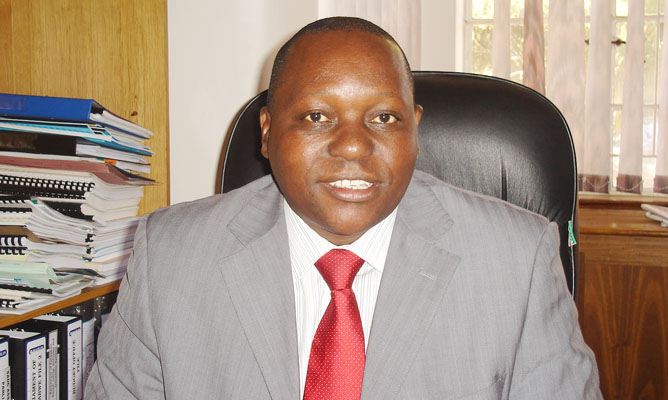
It was quite refreshing to hear Speaker of the National Assembly Jacob Mudenda last week voicing his concerns about the process of aligning laws with the Constitution.
The Speaker blamed the Justice, Legal and Parliamentary Affairs ministry for delaying the alignment process when he addressed a meeting between parliamentary committee chairpersons, the ministry and the Zimbabwe Lawyers for Human Rights.
The Speaker is absolutely right. The key pieces of legislation aligned with the Constitution since it was enacted into law on April 23 2013 include the National Prosecuting Authority Act, some aspects of the Electoral Act and the promulgation of the Trafficking in Persons Act to abide by international legal instruments against human trafficking. With over 400 statutes requiring alignment, it is safe to say the alignment process has not moved an inch.
One may argue that we currently have the General Laws Amendment Bill before Parliament that will align over 120 statutes with the Constitution. However, these are mainly cosmetic changes that have not tackled the substantive policy issues. A general laws amendment is never meant to do that.
As head of Parliament (Section 135 of the Constitution), the Speaker must be speaking out on issues that have a bearing on the reputation of the legislative branch of the government. The principle of separation of powers entails that Parliament makes law, the Judiciary interprets the law and the Executive enforces the law. So when laws have not been aligned with the Constitution, Parliament is ultimately responsible because its job is to make the law.
From the Executive side, the Attorney-General’s Office and the Law Development Commission, which are departments under the Justice ministry, are primarily responsible for law reform and drafting legislation that is tabled before Parliament. This means the ministry is the one mandated with taking the lead in the alignment process. It is, therefore, ultimately accountable for any delays in the process from the Executive side.
Granted, other line ministries must submit memorandum of principles or drafting instructions to the drafting division in the Attorney-General’s Office to guide the drafting process. However, this must not be used as an excuse for the delays. The Constitution is very clear on what needs to be aligned with it.
The drafting department must simply get on with the job as the principles for different pieces of legislation are already clarified in the supreme law.
- Chamisa under fire over US$120K donation
- Mavhunga puts DeMbare into Chibuku quarterfinals
- Pension funds bet on Cabora Bassa oilfields
- Councils defy govt fire tender directive
Keep Reading
If, for example, the constitutional principle for independent commissions is that they must be free from interference by anyone, legislation to set up these commissions must not then contain provisions that allow ministers to interfere with the work of the commissions as currently is the case with the Gender Commission Bill and to some extent the Zimbabwe Electoral Commission. And when the Constitution grants every person the right to freedom of assembly and association, we cannot have punitive provisions in legislation such as the Public Order and Security Act (POSA) and the Criminal Law (Codification and Reform) Act still remaining on our statute books. They should go away without any further delays.
Yes, the Constitution in Section 86 provides for limitation of some of the fundamental rights and freedoms. But the same Constitution clarifies that the limitation must be fair, reasonable, necessary and justifiable in a democratic society based on openness, justice, human dignity, equality and freedom.
In Zimbabwe, the Constitutional Court has already ruled that some of the provisions in POSA and the criminal law are unconstitutional.
Information minister Jonathan Moyo has spoken strongly against criminal defamation laws. I do not get why the defamation laws should not be repealed immediately if the responsible minister has spoken against them.
This requires that the portfolio committees of Parliament engage the minister on his position. The committees must be more proactive and not wait for draft legislation to be tabled and then start the process of engagement.
We all know that Parliament has a bad reputation of rubber-stamping draft legislation that comes from ministers.
This bad practice can be resolved if portfolio committees get involved early in the process of making laws. Section 140 of the Constitution says both the Senate and National Assembly have power to initiate, prepare, consider or reject any legislation. This means that individual MPs and portfolio committees can bring private member bills in order to address some of the delays in the alignment process.
Civil society organisations must assist in the alignment process through constructive submissions to portfolio committees and petitioning Parliament. Section 149 of the Constitution grants every citizen and permanent resident of Zimbabwe the right to petition Parliament to consider any matter within its authority, including the enactment, amendment or repeal of legislation.
The petition process is straightforward and clearly outlined in the rules of Parliament. Once the petition is approved by the Speaker for complying with the Constitution and parliamentary rules, it is referred to an appropriate portfolio committee for consideration and reporting to the House. This affords civil society a great opportunity to engage the responsible committee on issues of concern.
John Makamure is the executive director of the Southern African Parliamentary Support Trust. Feedback: [email protected]











